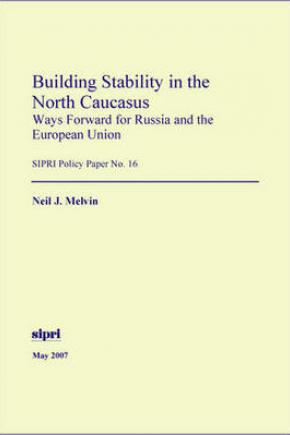Building Stability in the North Caucasus: Ways Forward for Russia and the European Union
For most people, the notion of conflict in the North Caucasus—a region within the Russian Federation, as distinct from the independent states of the South Caucasus—is synonymous with Chechnya. In reality, for centuries before the outbreak of the first Chechen war in 1994, this mountainous and economically underdeveloped area had been struggling both with conflict of identity among its local peoples and with the tensions caused by the southward extension of Russian (and later Soviet) sovereign authority. Ethnic, religious and political complexity makes it possible to interpret the region's instability from several viewpoints. Since 2001 in particular, Russia's tactic has been to cast its confrontation with local actors in terms of a struggle against terrorism fed by international and external jihadi influences. Under the banner of anti-terrorism, President Vladimir Putin's drive to solve this and all other local problems through forceful centralization has been pursued with minimal foreign involvement and, often, with all too little outside scrutiny.
Even backed with the latest technology, however, and benefiting from both improvements in Russian security coordination and the help of local proxies, Putin's strategy for the North Caucasus manifestly has not worked. Terrorist violence is leaking out into other parts of Russian territory; the absence of real local reconciliation is reflected also in the dubious loyalty of Putin's local henchmen; and the region's underlying economic and social problems are being addressed only belatedly and half-heartedly. The splintering of local Islamic communities and the terrorist methods adopted by certain pro-independence groups are effects as well as causes of a vicious circle of violence. As in Iraq and elsewhere, interpretations that blame everything on incitement by global terrorist movements or, indeed, on some destructive tendency inherent in Islam itself are not only mistaken but dangerously misleading when it comes to considering the way ahead.
In this Policy Paper, Neil Melvin—a former head of SIPRI's research programme on Armed Conflicts and Conflict Management—aims to correct such misunderstandings by a careful historical account of the role of the North Caucasus in earlier Russian and Soviet imperial history and of the evolution of the Russian Government's post-Soviet policies. He pays special attention to the Islamic strand in local resistance movements and in local society generally, showing that Russia's Muslims have been divided among themselves almost as sharply as any other element in the North Caucasus community. He ends by presenting recommendations for urgent shifts in policy towards the North Caucasus, aimed at two sets of actors that can perhaps do the most good in the shortest time in this troubled region: the Russian Government and the European Union and its member states.
This Policy Paper represents the first output of a larger research project being conducted by SIPRI with support from the Swedish authorities on the connections between Islam, terrorism and conflict in selected non-Arab locations.
Click here to download Policy Paper No. 16
About the author
Neil J. Melvin (United Kingdom) is a Senior Research Fellow of the Centre for European Policy Studies (CEPS) in Brussels. He was previously Leader of the SIPRI Armed Conflicts and Conflict Management Programme. Between 2001 and 2005 he was a senior adviser to the Organization for Security and Co-operation in Europe (OSCE) High Commissioner on National Minorities. He is the author of several books and articles on security and conflict in Eurasia and is the author of chapters on armed conflicts in the SIPRI Yearbook. He wrote an appendix on 'Islam, conflict and terrorism' for the SIPRI Yearbook 2006. In 2007 he will publish a SIPRI Policy Paper on the insurgency in southern Thailand.
1. Introduction: Instability in the North Caucasus
2. The roots of instability in the North Caucasus
3. The North Caucasus in the Putin era
4. Prospects for the North Caucasus
5. Recommendations

